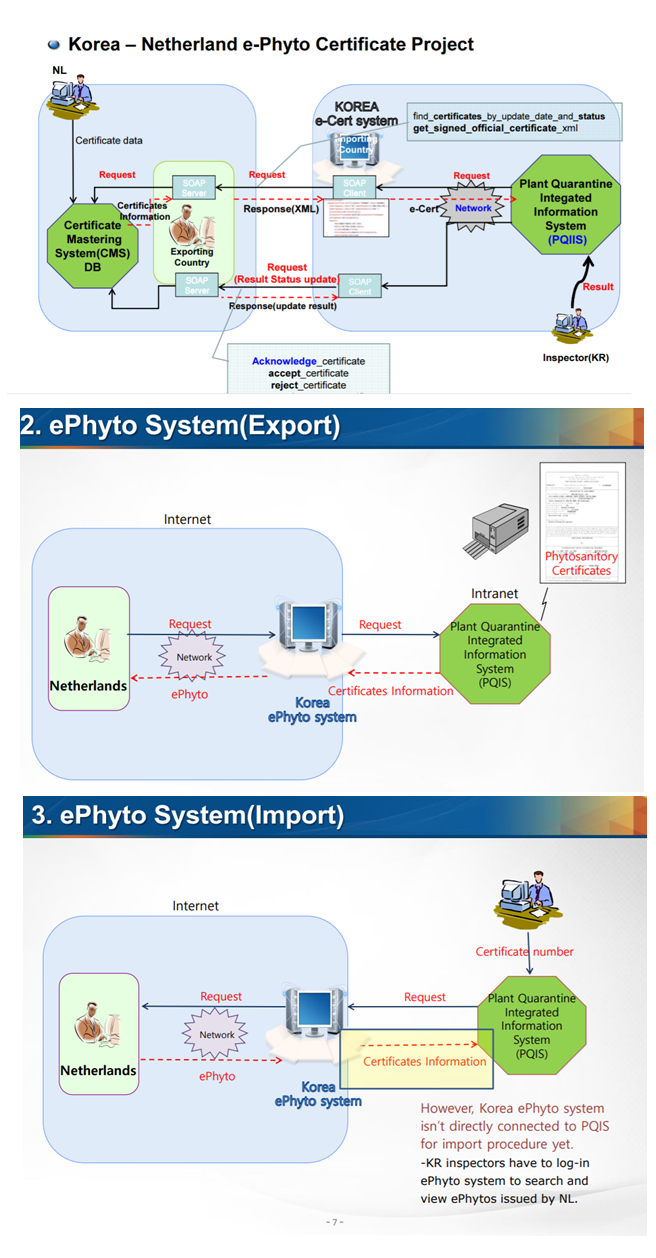A. General Information
1. Title
Korea-Netherlands e-Phyto Certificate Project
2. Status of the project
Pilot
3. Implementation period of the project/service:
5. Geographical coverage
Bilateral
Participating countries: Netherlands, Republic of Korea
6. Participating agencies/entities of the project/service:
a. Development stage
Lead agencies/entities
The Animal and Plant Quarantine Agency of the Republic of Korea, Netherlands Food and Consumer Product Safety Authority,International Plant Protection Convention Secretariat
Other participating agencies/entities
--
b. Operational stage
Lead agencies/entities (op)
The Animal and Plant Quarantine Agency of the Republic of Korea, Netherlands Food and Consumer Product Safety Authority,International Plant Protection Convention Secretariat
Other participating agencies/entities (op)
--
7. Main stakeholders/beneficiaries of the project
Traders (big enterprises)
Traders (SMEs)
Transport
Customs brokers
Customs
8. Business process category of the project
Regulatory/official control
B. Lessons Learned
9. Summary description of the project/service
a. Objective(s)
The Animal and Plant Quarantine Agency (APQA) of the Republic of Korea and the authorities of the Netherlands started a digital operation to exchange electronic phytosanitary certificates (ePhytos) developed by the Food and Agriculture Organization’s (FAO) International Plant Protection Convention (IPPC).
Given the volume of phytosanitary certificates, as well as reissued and superseding phytosanitary certificates that Netherlands’ authorities must track daily they developed a system for the electronic certification of imports.The system was designed to accommodate both plant and veterinary products entering the Netherlands. The system was then expanded to accommodate exports as well.
Before another country’s national system may interact with Netherland’s system and electronically exchange ePhyto certificates, an access agreement must be negotiated between the Netherlands and the other country. Based on that access agreement, the Netherlands adjusts its system and the other country adjusts its national system, so the two systems can communicate via the Internet.
b. Business need for the project (background)
To face the challenges deriving from the use of paper certificates .
c. Business process covered*
Exchange data of Phytosanitory Certificates using SOAP method.
SOAP (Simple Object Access Protocol) is an XML-based messaging protocol for exchanging information among computers. SOAP is an application of the XML specification.
SOAP is a communication protocol designed to communicate via Internet.
SOAP can extend HTTP for XML messaging.
SOAP provides data transport for Web services.
SOAP can exchange complete documents or call a remote procedure.
SOAP can be used for broadcasting a message.
SOAP is platform- and language-independent.
SOAP is the XML way of defining what information is sent and how.
SOAP enables client applications to easily connect to remote services and invoke remote methods.
d. Overall architecture and functionalities*
Fore more detail please refer to the link:https://www.ippc.int/static/media/files/publication/en/2016/02/Tuesday_Presentation_9_Country_Presentations_-_South_KoreaNovember_10_FinalPT_Seiki.pdf

e. Relevant document/figure
--
10. Documents and data exchanged via the project
Exchange of electronic Phytosanitary Certificates
11. Data models/databases, proprietary solutions, hybrid approaches
--
12. Main challenges faced during the project
Legal matters
Technical matters (Formats, harmonized terms, exchange mechanism)
13. Lessons learned from the project
--
14. Main benefit(s) of the project
Enhanced regulatory compliance*
Transaction Cost savings*
Transaction Time savings
Simplified process
14A. Elaborations/detailed description on benefits gained
Expedite international trade
Eventually lead to paperless trade
More efficient certification process
Reduced fraud
Increase transparency
15. Technical/financial/capacity building/other assistance
--
16. Future plan for expansion of the project
Modification to established standard of XML, schema, Harmonized Terms (Code lists) and Exchange Mechanism
Support for IPPC Global Hub
17. Other information or relevant references on the project
--
18. Relevant document regarding the project
--
C. Relevant Standards
19. Name(s) of any international, national legal instrument underpinning the project
Bilateral agreement
20. Electronic message standard
20A. Electronic message standard supporting the project
20B. Type of standard for electronic message applied for the project
--
21. Technical communication standard
21A. Technical communication standard supporting the project
21B. Type of technical communication standard applied for the project
--
22. Security-related standards*
22A. Security-related standard supporting the project
--
22B. Type of security-related standard applied for the project
--
23. Other Technical Information
23A. Interface developed for data exchange with an internal system
--
23B. Other technical implementation information
--


